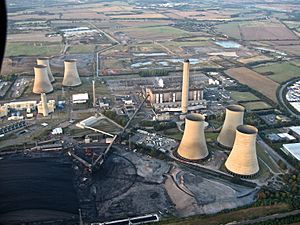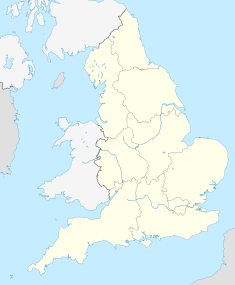Didcot power station facts for kids
Quick facts for kids Didcot Power Station |
|
|---|---|

Didcot Power Station
Viewed from the south in September 2006 |
|
|
|
|
| Country | England |
| Location | Oxfordshire, South East England |
| Coordinates | 51°37′25″N 1°16′03″W / 51.62363°N 1.26757°W |
| Commission date | 1968 |
| Operator(s) | Central Electricity Generating Board (1968-1990) National Power (1990-2000) Innogy (2000-2002) RWE npower (2002-present) |
| Power station information | |
| Primary fuel | Coal-fired |
| Secondary fuel | Natural gas-fired |
| Tertiary fuel | Biofuel |
Didcot Power Station is actually two big power plants right next to each other. They are called Didcot A Power Station and Didcot B Power Station. These stations make electricity for the National Grid, which powers homes and businesses across the UK.
You can find them near the town of Didcot in Oxfordshire, England. The power stations are easy to spot because they have a very tall chimney and six huge cooling towers. These towers are so big you can see them from far away!
Contents
Didcot A: The Coal Powerhouse
Didcot A was the first power station built here. It's the biggest of the two. This station has the large, famous cooling towers. These towers help cool down the water used to make electricity.
How Didcot A Makes Power
Didcot A can make a huge amount of electricity, up to 2,000 megawatts. To give you an idea, 2,000 megawatts is like 2,000 million watts! A regular lightbulb only uses about 50 or 60 watts.
This power station mainly burns coal to create energy. But it can also use oil, natural gas, or even biomass like wood.
From Fuel to Electricity
First, solid fuels like coal are ground into a fine powder. This is done in huge mills, a bit like old windmills, but powered by electric motors. Grinding the fuel helps it burn better.
Then, this powdered fuel is blown into a giant boiler with lots of air. Inside the boiler, the fuel burns to create very hot, high-pressure steam. This steam then spins a large machine called a steam turbine.
The turbine is connected to a generator. As the turbine spins, the generator creates electricity. This electricity is then sent out to the National Grid for everyone to use.
Didcot B: The Gas Powerhouse
Didcot B is the second power station built in Didcot. This one runs only on natural gas. It can produce almost 1,500 megawatts of electricity.
Smart Way to Make Power
Didcot B uses a clever method called combined cycle gas turbines (CCGT). This means it uses two types of turbines together to be super efficient.
First, it uses gas turbines, which work a bit like the engines in an airplane. Then, the hot gases from these turbines are used to create steam, which powers a second set of steam turbines. This way, very little energy is wasted.
Didcot B has smaller cooling towers than Didcot A. They are not as easy to see, but they often create a noticeable cloud that looks like it's coming from the ground.
Images for kids



